Posts Tagged ‘United Nations’ (98 found)
One Month On From Signing Sexual Violence Declaration – No Action Taken
One month on from signing the Declaration Of Commitment To End Sexual Violence In Conflict, the government of Burma appear to have taken no steps at all to implement the declaration.
Burma Campaign UK published a new briefing paper today looking at the 12 commitments the government has made to end sexual violence, and the progress made so far on each of these. Each was rated zero progress […]
• • •Myanmar’s Rosewood Crisis
Extremely rapid growth in Chinese imports of ‘redwood’, ‘rosewoods’ or ‘Hongmu’ timbers from Myanmar in the past two years is directly driving increased illegal and unsustainable logging, posing a real threat to governance, the rule of law and the viability Myanmar’s dwindling forests.
EIA research shows that, based on current trends, the two most targeted Hongmu species in Myanmar – tamalan and padauk – could be logged to commercial extinction in as little as three years.
With financial rewards for illegal loggers and timber smugglers dwarfing traditional incomes, and evidence of corruption facilitating illegal business, Myanmar’s domestic controls will be unable to effectively stem illegal trade.
Myanmar urgently needs to engender legal reciprocity from strategic timber trade partners, particularly China, to ensure Myanmar’s forestry and trade laws are respected along its land border […]
• • •Burma: End the Prosecution of Rohingya Human Rights Defender Kyaw Hla Aung
Bangkok-Geneva-Paris-Rangoon. The Burmese Government must end the prosecution of Rohingya human rights defender Kyaw Hla Aung and immediately release him, the Observatory for the Protection of Human Rights Defenders, an FIDH-OMCT joint programme, and the Alternative ASEAN Network on Burma (ALTSEAN-Burma) said today […]
• • •State of the Word’s Minorities and Indigenous Peoples 2014
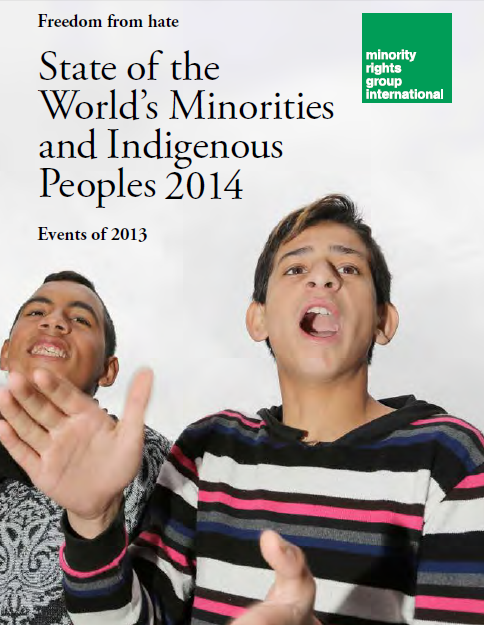 Hate crime towards minorities and indigenous peoples is a daily reality across Asia but is often ignored by the governments of the region, Minority Rights Group International (MRG) warns in its annual report. This year’s flagship report, State of the World’s Minorities and Indigenous Peoples 2014, is themed around ‘Freedom from Hate’ and shows that a worrying trend of vilification and hostility towards minorities and indigenous peoples has spread across the region.
Hate crime towards minorities and indigenous peoples is a daily reality across Asia but is often ignored by the governments of the region, Minority Rights Group International (MRG) warns in its annual report. This year’s flagship report, State of the World’s Minorities and Indigenous Peoples 2014, is themed around ‘Freedom from Hate’ and shows that a worrying trend of vilification and hostility towards minorities and indigenous peoples has spread across the region.
A key aspect of hate crime and hate speech is its invisibility, especially when governments or societies overlook or tolerate entrenched patterns of discrimination against particular communities, says MRG. Across Asia, governments have failed to provide adequate protection to its minority and indigenous populations.
“Hate crimes have been able to flourish in Asia largely as a result of the complicity or support of politicians who stand to gain from the persecution of minorities,” says Mark Lattimer, MRG’s Executive Director. “Hate speech goes unchallenged and crimes are often under-acknowledged and under-reported, enabling perpetrators to operate with impunity.” […]
• • •Now is the Time to Act, Sexual Violence Must End in Burma
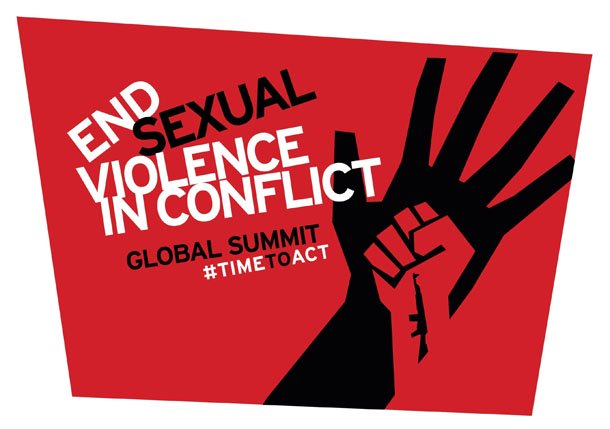 On 10 June 2014, the Burma government prepared to sign the ‘Declaration of Commitment to End Sexual Violence in Conflict’ at the end of a three-day global summit, which aimed to “shatter the culture of impunity for sexual violence in conflict.” On the same day, a woman was brutally beaten by a Burma Army soldier during an attempted rape in Rezua, Chin State. The eyewitnesses who spoke to the Chin Human Rights Organization said that the women was held down by the soldier, while he repeatedly beat her. She was rushed to the hospital and is fortunately now in recovery.
On 10 June 2014, the Burma government prepared to sign the ‘Declaration of Commitment to End Sexual Violence in Conflict’ at the end of a three-day global summit, which aimed to “shatter the culture of impunity for sexual violence in conflict.” On the same day, a woman was brutally beaten by a Burma Army soldier during an attempted rape in Rezua, Chin State. The eyewitnesses who spoke to the Chin Human Rights Organization said that the women was held down by the soldier, while he repeatedly beat her. She was rushed to the hospital and is fortunately now in recovery.
However, this brutal event has lead to a series of demonstrations in Rezua and Matupi, Chin State this week, calling for an end to sexual violence. According to The Irrawaddy, protesters held placards that stated: “Stop raping; We are humans, not animals. We are humans, not property.” Though the organizers requested to hold the rally, the local police denied their applications and they have been arrested for staging a peaceful demonstration without permission, ironically under the Peaceful Assembly and Peaceful Procession Law.
This recent case of attempted rape is not a one-off incident of a rogue Burma Army soldier. A report produced by Women’s League of Burma (WLB) ‘Same Patterns, Same Impunity’ demonstrates how the sexual violence inflicted by the Burma Army soldiers are systematic in nature and a part of a wider structural system of politicizing women’s bodies and abusing them as instruments of war and oppression. The data collected by WLB and its members found that since the 2010 elections, over 100 cases of rape has been documented, of which 47 were brutal gang rapes and victims were as young as eight years old. Most of the documented cases were linked to Kachin and Northern Shan State where military offensives have been taking place since 2011, indicating that rape and sexual violence is in fact, used as a weapon in an attempt to demoralize the ethnic communities and to assert dominance over them […]
• • •Myanmar: Comprehensive Solutions Needed for Recent and Long-term IDPs Alike
IDMC estimates that there are up to 642,600 internally displaced people (IDPs) in Myanmar, forced to flee their homes by armed conflict and inter-communal violence. The figure includes up to 400,000 people living in protracted displacement as a result of conflict in the south-east of the country – in southern Shan, Kayah, Kayin and Mon states and Bago and Tanintharyi regions – and 98,000 displaced by conflict in Kachin and northern Shan states since 2011. It also includes around 140,000 people displaced by inter-communal violence in Rakhine state since 2012, and more than 5,000 who fled their homes in Mandalay region in 2013. Disasters brought on by natural hazards and forced evictions linked to land grabs and the exploitation of natural resources have caused further displacement, including in areas where people have already fled conflict and violence.
Landmines and unexploded ordnance constitute a significant obstacle to IDPs’ return in Kachin, northern Shan and the south-east. Internally displaced women and girls in Kachin and northern Shan face the threat of sexual violence. Muslim IDPs in Rakhine are confined to camps, where they have little or no access to health care, education or livelihoods, and shelters are in need of maintenance in Rakhine, Kachin and northern Shan […]
• • •Finnwatch Researcher Andy Hall Faces Court in First ‘Natural Fruit’ Hearing 2nd July, Insists No Meaningful Negotiation Likely
Andy Hall and his team, with TFFA/TTIA representatives, in front of the Prakanong Court prior to his detention pending bail on 18th June 2014
British migrant rights activist Andy Hall, who campaigns to improve conditions for migrant workers in Thailand, will face Prakanong Criminal Court at 830am on Wed. 2nd July in his first formal appearance before a Thai court in numerous criminal and civil cases filed against him by Natural Fruit Company Ltd […]
• • •Thai Industry Commits to Support Bail Out
On Wed. 18th June at 9am, British migrant rights activist Andy Hall,
who campaigns to improve conditions for migrant workers in Thailand,
will be escorted from Bangna police station, Bangna district, Bangkok
by police officers to meet officials at the Prakanong Public Prosecutors Office, Bangkok to learn the public prosecutor?s decision whether the latest criminal charges filed against him by Natural Fruit Co. Ltd. will be ordered prosecuted at Prakanong district court […]
Religious Conversion Law Threatens Religious Freedom in Burma/Myanmar
Over 80 organizations from civil society worldwide today call on the Government of Burma/Myanmar to scrap proposed legislation that would unlawfully restrict the right to freely choose a religion. If adopted, this law would violate fundamental human rights and could lead to further violence against Muslims and other religious minorities in the country […]
• • •Myanmar: End Wartime Torture in Kachin State and Northern Shan State
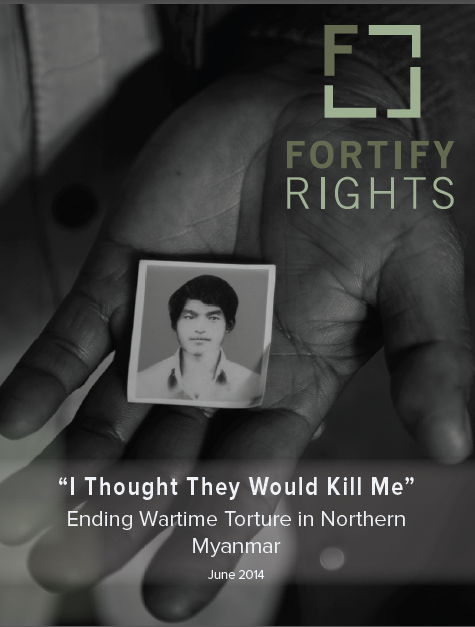 (Yangon)— For the past three years, Myanmar authorities have systematically tortured Kachin civilians perceived to be aligned with the Kachin Independence Army (KIA), Fortify Rights said in a new report released today. Fortify Rights believes these abuses constitute war crimes and crimes against humanity. The government of Myanmar should intervene immediately to end the use of torture in the conduct of the ongoing war in Kachin State and northern Shan State, and it should credibly investigate and prosecute members of the Myanmar Army, Myanmar Police Force, and Military Intelligence who are responsible for the serious crimes described in this report.
(Yangon)— For the past three years, Myanmar authorities have systematically tortured Kachin civilians perceived to be aligned with the Kachin Independence Army (KIA), Fortify Rights said in a new report released today. Fortify Rights believes these abuses constitute war crimes and crimes against humanity. The government of Myanmar should intervene immediately to end the use of torture in the conduct of the ongoing war in Kachin State and northern Shan State, and it should credibly investigate and prosecute members of the Myanmar Army, Myanmar Police Force, and Military Intelligence who are responsible for the serious crimes described in this report.
The 71-page report, “I Thought They Would Kill Me”: Ending Wartime Torture in Northern Myanmar, describes the systematic use of torture and other cruel, inhuman, and degrading treatment or punishment (“ill treatment”) of more than 60 civilians by Myanmar authorities from June 2011 to April 2014. Members of the Myanmar Army, Myanmar Police Force, and Military Intelligence deliberately caused severe and lasting mental and physical pain to civilians in combat zones, […]
• • •
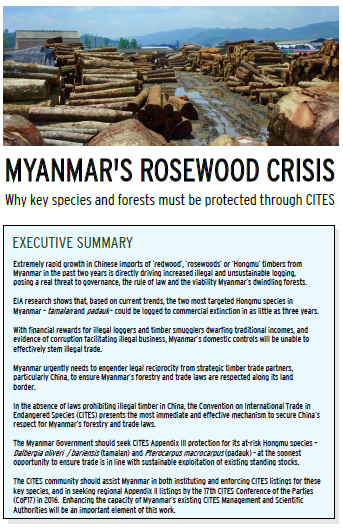
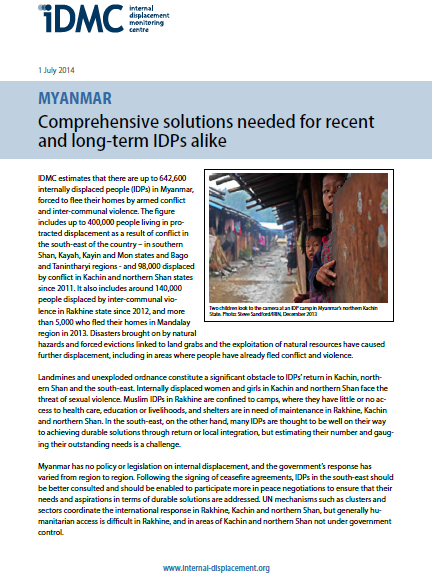








 All posts
All posts